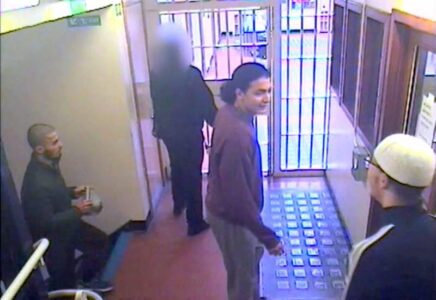
British authorities urged to separate extremist inmates after Manchester Arena terrorist formed gang
The UK’s independent adviser on terrorism has urged the authorities to look at separation centres to prevent extremists from forming gangs in prison.
It comes as three convicted ISIS terrorists, including the brother of the Manchester Arena bomber, formed a gang in Belmarsh prison, London, and attacked a prison officer.
Ringleader Hashem Abedi, 24, Parsons Green Tube bomber Ahmed Hassan, 22, and Muhammed Saeed, 23, were this week given longer jail sentences after they attacked Paul Edwards in May 2020.
Jonathan Hall QC, the independent reviewer of terrorism legislation, said the case demonstrated an attempt by an “established gang” to seize power from authority.
He suggested that measures such as “separation centres” could be used to keep terrorists in custody away from one another.
“I think it’s a problem that they were allowed to associate in a way that led to the formation of a gang,” he said.
“In terms of what you do about it, I think you’ve got to recognise that these are not just gangs like any other gangs.
“This is a gang led by a terrorist mass murderer, and the consequences of this sort of gang led by this sort of individual having influence within the prison are so serious that it has to be disrupted – in terms of the impact on other prisoners, recruitment and radicalisation within prison, and potential encouragement to further offences against the authorities.”
Mr Hall said the authorities should be “praised” for bringing the case to court.
It is a “very clear and public record of what they have done and it will enable the authorities to manage these individuals in future with greater confidence”, he said.
Abedi was jailed after he conspired with his elder brother, Salman Abedi, 22, to bomb Manchester Arena as it hosted an Ariana Grand concert in May 2017. Twenty-two people were murdered and hundreds injured.
Hashem Abedi is suspected of being the leader of a group of Islamist extremist terrorist inmates at Belmarsh’s “prison within a prison”, Woolwich Crown Court was told during the gang’s assault trial this week.
He was joined by Hassan, who was sentenced to life after planting a device that injured 51 passengers on the London Underground in September 2017, and Saeed, who was convicted of carrying a knife for terrorist purposes.
Prior to the attack on the prison officer, all three were involved in a fight with a group of non-Muslim inmates on March 1, 2020.
As a punishment, their status under the prison system’s Incentives programme was downgraded from “standard” to “basic”.
This meant they lost privileges including their televisions and would have less time with other prisoners, fewer visits and no access to entertainment items such as games stations and DVD players.
The court heard Abedi had orchestrated six complaint letters from prisoners. One was from Mohiussunnath Chowdhury, 30, an extremist who was sentenced to life in jail with a minimum term of 25 years in July 2020 after plotting a gun and knife rampage at London tourist spots.
Abedi and Hassan had their privileges downgraded again by Mr Edwards after shaving their heads without permission. In response, Abedi met the prison governor on the day of the subsequent attack to say “he and his brothers wanted the regime changed”.
Mr Hall QC said the gang’s behaviour shows they were trying to seize power from the authorities.
“There’s territorial behaviour here,” he said.
“So, not just the attack on the prison officer but there was an orchestration of complaints and there was an attempt to get the regime changed on behalf of him and his brothers. And brothers here means fellow Islamist gang members.
“So this case demonstrates an attempt by an established gang to seize power from the authority.”
Mr Hall QC has been reviewing terrorism in prisons in England and Wales. His findings are expected to be published later this year.
On Tuesday, a jury convicted the men of assault causing actual bodily harm.
Ms Justice Cheema-Grubb sentenced Abedi to another three years and 10 months consecutive to his current sentence and handed Hassan and Saeed additional three-year jail terms.
The judge said they had “shown disrespect for society and its rules” and that the prison officers faced “danger every single day”.
“The courts must deal firmly with anyone who breaches the law in such grave circumstances,” she told them.
Source: The National News





